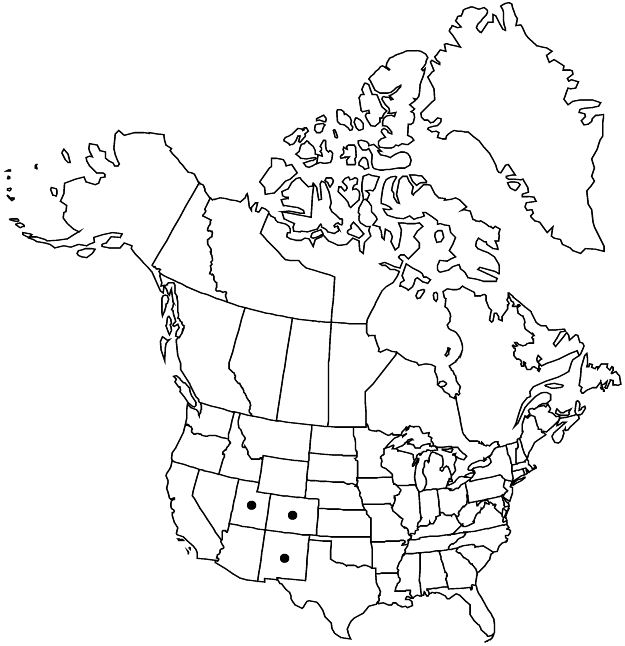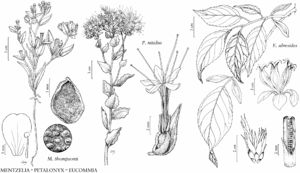Difference between revisions of "Mentzelia thompsonii"
Madroño 23: 289, figs. 2A,B. 1976.
FNA>Volume Importer |
FNA>Volume Importer |
(No difference)
| |
Revision as of 18:20, 24 September 2019
Plants wandlike or candelabra-form, 5–20 cm. Basal leaves not persisting. Cauline leaves: petiole present or absent (proximal leaves), absent (distal leaves); blade ovate to linear (proximal leaves), ovate to lanceolate (distal leaves), to 6 cm, margins entire. Bracts green, elliptic to oblanceolate, 3.3–6.2 × 1.5–3.2 mm, width 1/4–7/8 length, not concealing capsule, margins entire. Flowers: sepals 1–3 mm; petals yellow, 2–4 mm, apex retuse to rounded; stamens 10–30, 2–3.5 mm, filaments monomorphic, filiform, unlobed; styles 1.5–3 mm. Capsules cylindric or clavate, 5–16(–20) × 2–4 mm, axillary curved to 45° at maturity, often prominently longitudinally ribbed. Seeds 10–25, in 2+ rows distal to mid fruit, tan, dark-mottled, irregularly polygonal, surface smooth to minutely tessellate under 10× magnification; recurved flap over hilum absent; seed coat cell outer periclinal wall domed, domes on seed edges less than 1/2 as tall as wide at maturity. 2n = 18.
Phenology: Flowering Apr–Jun.
Habitat: Barren clay to silt slopes, usually on Mancos Shale barrens.
Elevation: 1300–2000 m.
Distribution

Colo., N.Mex., Utah.
Discussion
Mentzelia thompsonii was originally described as Acrolasia humilis, which has caused some confusion with M. humilis (A. Gray) J. Darlington of sect. Bartonia (J. J. Schenk 2009). Subsequently, M. thompsonii was incorrectly treated as a synonym of M. humilis by J. T. Kartesz and C. A. Meacham (1999), leading to lack of recognition of this easily distinguished species in several plant databases and herbaria. Mentzelia thompsonii is distributed predominantly along the Colorado-Utah border south to the Four Corners region.
Selected References
None.
